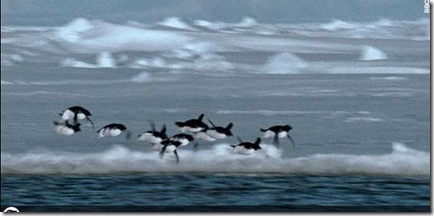If you think all penguins can not fly, think again! BBC's new natural history series Miracles of Evolution camera crews have discovered a colony of Adélie penguins which can fly when they were filming on King George Island, some 750 miles south of the Falkland Islands. Film maker and writer Terry Jones is to present this unique bird unlike any other penguins in the world on the BBC's programme. The flying penguins video above is an ad for the BBC iPlayer. It's not an sole April Fools' prank:
To be fair, it IS an ad for the iPlayer, but it IS also specifically for April Fools. On the iPlayer site, the top video featured is the flying penguins, and the next one to the side is the “making of” the April Fools ad. Sadly, you can’t watch it on site unless you live in the UK.

Apparently, global warming is blamed for leading the Adelie penguins to develop the (probably unnecessary) flying capacities:
One of the first direct evolutionary responses to climate change has been observed in a species of penguin. A shrinking Antarctic ice shelf, a result of increasing global temperatures, has lead to a lack of breeding of sites and difficulty in finding food.
In response to these pressures a population of Adelie Penguins has rapidly evolved and reacquired the ability to fly. Film footage of this amazing development has been captured for the first time and the ornithological world has come together to highlight the dangers of climate change.
“Climate change is one of the greatest threats to the world’s birds. This species of penguin has evolved to cope with the rise in temperature and loss of ice but we should not be complacent and think that all species will manage”, says Dr Stuart Butchart, BirdLife's Global Species Programme Coordinator. “With hundreds of species at imminent risk of extinction there has never been a greater need for conservation.”
BirdLife International is now highlighting another danger being posed to this newly evolved species of penguin.
“The ability to fly now means that these penguins are able to forage for food over a much wider area. However, this puts them at risk from longline fisheries”, says Adrian Long, BirdLife's Head of Communications.


